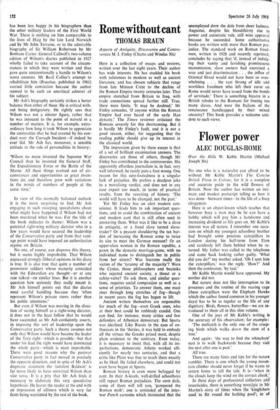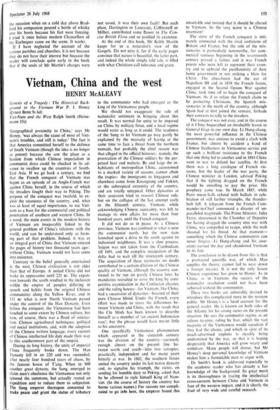Flower power
ALEC DOUGLAS-HOME
Over the Hills W. Keble Martin (Michael Joseph 30s) No one who is a naturalist can afford to be without Mr Keble Martin's The Concise British Flora in Colour, for it is a complete and accurate guide to the wild flowers of Britain. Now the author has written an inti- mate and modest postscript telling us how it was done—between times—in the life of a busy clergyman.
Here is an object-lesson which teaches that however busy a man may be he can have a hobby which will pay him a handsome and increasing dividend as life goes on. Mr Keble's interest was all nature. I remember one occa- sion on which my youngest schoolboy brother had brought some precious caterpillars to London during his half-term from Eton and carelessly left them behind when he re- turned. My father was called to the telephone and came back looking rather guilty. 'What did you do?' my mother asked. 'Oh I sent him the caterpillars,' was the reply. 'How?' And then the confession, 'by taxi.'
Mr Keble Martin would have approved. My mother did not.
But nature does not like interruption to its processes and the routine of the rearing cage (these caterpillars were the Elephant Hawks which the author found common in his younger days) has to be as regular as the life of any dignitary. Birds, flowers, butterflies—we are in- troduced to them all in this slim volume.
One of the joys of Mr Keble's writing is the accuracy of his observation; for example: 'The nuthatch is the only one of the creep- ing birds which walks down the stem of a tree.'
And again : 'the way to find the whinchats' nest is to walk backwards because they visit the nest after one is past.'
All true.
There are many hints and tips for the nature rambler. There is one which the young moun- tain climber should never forget if he wants to return home to tell the tale., is—'when in the clouds keep the wind on the correct cheek.'
In these days of professional collectors and insecticides, there is something nostalgic in Mr Martin's story of times when. the 'kingfishers used to flit round the bathing pod; or of
the occasion when on a cold day above Brad- ford his companion poured a bottle of whisky into his boots because his feet were freezing. I tried it once before modern Chancellors of the Exchequer came on the scene. It works.
If I have neglected the account of the various parishes and churches, it is not because they do not have their interest but because the reader will conclude quite early in the book that if the souls of Mr Martin's charges were not saved, it was their own fault! But each place, Dartington or Lancaster, Coffinswell or Milber, contributed some flower to The Con-, cise British Flora and so justified its existence.
At the end of this book, Mr Keble Martin keeps for us a naturalist's view of the Gospels. Do not miss it, for if the early pages convince that nature is beautiful, the latter part, and indeed the whole simply told tale, is filled with what Christians call tolerance and grace.







































 Previous page
Previous page